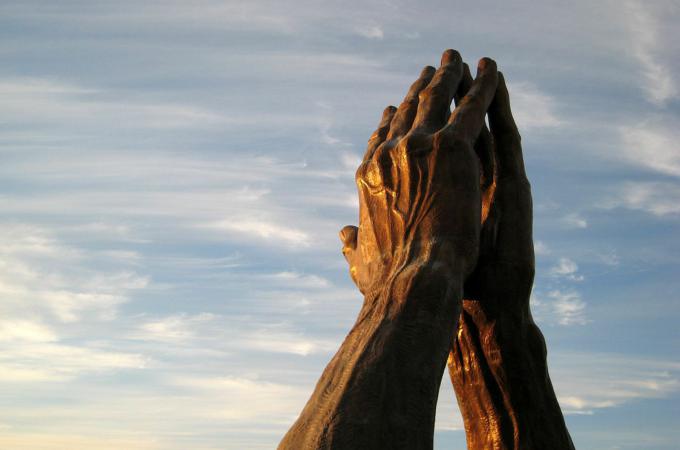Changing God's mind?
Q. I'm confused about something and would be grateful for your help. Does prayer change God's mind? Can someone be moved to the head of the line if we pray hard enough? (Cuba, Missouri)
A. To answer this question, we first need to admit our limitations. I cannot pretend to know the mind of God. No one can, so long as we are still on this side of heaven.
But what I do know is that Jesus told us to pray. He said that whatever we ask for in prayer will be granted (Mk 11:24; Jn 15:7), and he even said that we should pray for those who persecute us (Mt 5:44).
Throughout the Scriptures, which we believe to be inspired by God, we are instructed to pray for the sick (Jas 5:14), for leaders of government (1 Tm 2:2), for ministers of the Gospel (Eph 6:19).
I do not think that prayer changes God's mind. In his infinite wisdom and foreknowledge, God already knows what's going to happen.
But that divine plan, I believe, takes into account the fact that we will pray for certain things and is guided in advance by the prayers that we will offer. So people, in my view, don't "jump the line" because we pray for them; they are already standing at the front because God knew from all eternity that we would do exactly that.
As I said, I don't purport to know exactly how it all works, and I look forward to grasping it better when, hopefully, I arrive in God's presence. Meanwhile I will continue to pray for others, especially those in particular need, because Jesus told me to -- and I trust that they will continue to pray for me.
Q. When I was a Protestant, I was told that a young Joseph and Mary would later go on to have other children together, after Jesus. (Jesus would have been the eldest, and these other children would have been his half-brothers and sisters.)
Now, as a Catholic, I've been told that Joseph was significantly older than Mary, was more of a guardian than a husband, that he had children from a previous marriage and that his first wife had passed away. These children would have been older than Christ and would have been his stepbrothers and sisters. I'm also told that Joseph and Mary never had any children of their own and that Mary remained a perpetual virgin.
I have also heard that in the Scriptures, where it talks about the "brothers and sisters" of Jesus, those words could be just generic, meaning "relatives." Any help? (southern Indiana)
A. You are correct that the belief of the Catholic Church is that Mary was a perpetual virgin -- before, during and after the birth of Jesus. That doctrine is reflected when we pray in the Confiteor at Mass "blessed Mary ever-virgin."
What are we to say, then, of the fact that the New Testament refers in several places to the "brothers and sisters" of Jesus? In Mk 6:3, for example, when onlookers were marveling at the wisdom and works of Jesus, they asked: "Is he not the carpenter, the son of Mary, and the brother of James and Joses and Judas and Simon? And are not his sisters here with us?"
The explanation most commonly offered by Catholic scriptural scholars is that the Greek words in the original language of the Gospels ("adelphos" and "adelphe") can mean not only biological siblings (what we understand as "brother" and "sister") but cousins or even close friends or associates.
Another explanation, though -- likewise acceptable in the church's eyes -- is that Joseph was a widower at the time he was betrothed to Mary, and that these Gospel passages refer to children of Joseph from that previous marriage. This theory finds support in that Joseph is nearly always portrayed in art as much older than Mary and that he had evidently died before the public life of Christ or he would have been mentioned by the evangelists for his role at that time.
What I find a bit puzzling, though, about this second theory is that, moments before he died on the cross, Jesus entrusted Mary to the care of the apostle John -- rather than to one of his "brothers," as the law would have prescribed.
(Finally, allow me to comment, if I may, on your description of Joseph as "more of a guardian than a husband." I quite imagine that Joseph offered Mary strong emotional support -- particularly at such times as the announcement of the annunciation, the flight into Egypt and the disappearance of the 12-year-old Jesus in Jerusalem before he was found in the Temple.)
- - -
Questions may be sent to Father Kenneth Doyle at askfatherdoyle@gmail.com and 30 Columbia Circle Dr., Albany, New York 12203.
- Father Kenneth Doyle is a columnist for Catholic News Service



















